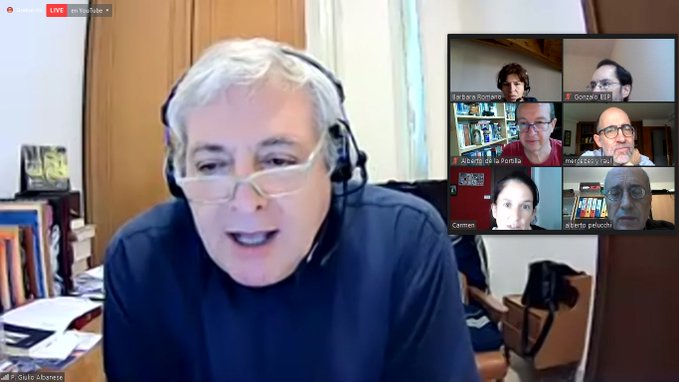
As Christians, as missionaries, we cannot watch calmly from our windows as the global economic system evolves, putting at risk food security and the effective rights of more and more populations. Faced with the complexity of this terrain, we need a minimum of training in these issues.
The Comboni Missionary Giulio Albanese, a journalist specializing in the field of economics, led the reflection on Economy: Land of Mission, at the meeting of the Comboni Lay Movement of Europe, which was attended last Saturday by participants from Poland, Germany, Portugal, Italy and Spain, as well as the CLM coordinator of Brazil, Flavio Schmidt. The anniversary of the attack on the Twin Towers, which reshaped geopolitics, and the Time of Creation, in which the Christian confessions unite every year to pray, celebrate and act for the Common Home, were the framework for this initiative.
Albanese started from the recent historical process that has shaped the current landscape of the global economic system, initiated at the Breton Woods conference at the end of World War II. Along the way, the financial economy has progressively grown and distanced itself from the real economy. The latter is based on the fact that human labor creates wealth, while the financial economy is based on the fact that money itself generates wealth. The crisis that began in 2008 revealed the consequences of an economic system in which speculative financial products, such as derivatives, represent an economic flow of between 10 and 15 times the global GDP. Another worrying element is that the debt of the states, which is weighing down the economies of the southern communities in particular, is financialized and therefore subject to the uncertainties of the market. Government debt has become a financial product that is bought and sold, generating profits for other investors.
As a proposal to combat the flagrant issue of international debt, a legal document was launched from Italy at the end of the last century, within the framework of the Jubilee 2000, supported by the UN Commission on Human Rights, to argue that the international debt mechanism is contrary to human rights, so that its agreements could be denounced before the Court of the Hague.
The speaker shared from his missionary experience in Ethiopia how, while famine threatens the population, the state accumulates grain in warehouses to offer it to global agribusiness (which fixes its price on the Chicago Stock Exchange) and thus pay the interest on its debt. In another example, he denounced the risk of common goods, such as health, being controlled only by the market, which means that while in the North we are moving towards the third dose of the COVID19 vaccine, in Africa only 1% of the population has the second dose.
The Church has generated abundant reflection in the various social encyclicals, since Rerum Novarum at the end of the 19th century, and the magisterium of Pope Francis stands out for placing the poor and discarded person at the center, not as a pastoral object, but as a theological subject: God is incarnated in the poor. The concept of development, linked to technology and profit, must be replaced by that of progress, which refers to the person and his or her social aspect. In the face of a complex issue, such as the economic system, it is not possible to give a magic answer but, as Francis insists, to participate and initiate transformative processes.
In this context, Albanese proposed not to demonize the market, but to coexist with it and promote alternative economies from within, as the Vatican initiative of the Economy of Francis and Clare has been promoting. Not to promote a mystique of misery, which only promotes sharing the suffering of communities without taking another step. The Social Economy is a field with great development, in which companies arise whose objective is not to generate profits, but to solve people’s problems. The microcredits promoted by the Nobel Prize winner M. Yunus are a tool, as well as Ethical Banking (Fiare, Coop 57, Triodos…). We must also promote laws that can redirect business actions, because the deregulation promoted by liberalism leaves communities in the hands of unscrupulous companies. The European alliance of ecclesial entities CIDSE is working on this corporate regulation.
For religious congregations there is the task of responsibly reviewing in which initiatives they invest their resources. We currently have two divestment campaigns underway. The Laudato Si’ movement promotes divestment from companies that favor fossil fuels, while the Churches and Mining network, in which the CLM and the Comboni Missionaries of Brazil participate, seeks divestment from mega-mining companies, which threaten populations and the environment. And to bet on an integral evangelization in which the promotion of social transformation is present. The recent Map of Comboni social ministries presents examples of this type.
For the Comboni lay movement there would be the task of deepening how our lifestyles contribute to underpinning the global financial system or to come up with alternatives. The CLM in Italy has been working in this direction with an important prophetic component. In Spain, the platform Connected Yourself for Justice, in which the Comboni NGO AMANI participates, has also proposed to reflect in this sense. It is also necessary that we feel that we can influence the policies that can control the economic-financial system, from our closest family and parish environments, to the decision-making bodies, participating in actions together with organized platforms. In this sense, last year several CLM participated in a training on political advocacy promoted by the REDES platform.
The meeting concluded with a dialogue among the participants to advance in our formation as CLM and to strengthen ties with the rest of the Comboni Family in this area.
You can see the complete video of the meeting.
Gonzalo Violero, CLM Spain



